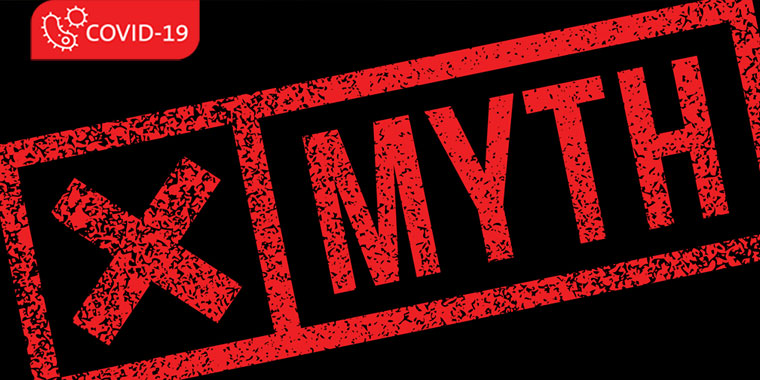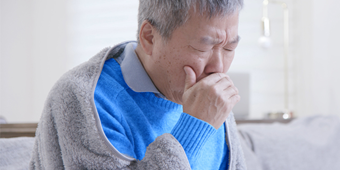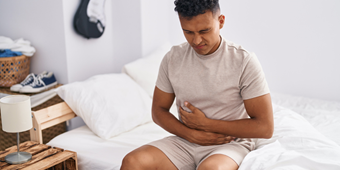Busting Some COVID-19 Myths

Find Your Perfect Match
Answer a few questions and we'll provide you with a list of primary care providers that best fit your needs.
News about COVID-19 is constantly changing. So are myths about COVID-19.
Frankly,
we’re confused. Maybe you are, too.
That’s why Premier Health Now asked Roberto Colón, MD, Premier Health Vice President of
Quality and Safety, to help sort out the fiction from the fact.
Here’s a sample of what’s out there (some completely untrue, some with a shred of truth or possibility, and for good measure, valid advice from Dr. Colón):
5G mobile networks cause COVID-19.
5G, the next generation of wireless technology, is the
subject of varying myths and conspiracy theories, from carrying the coronavirus, to causing symptoms similar to COVID-19, to weakening the immune system, making people more susceptible to infection.
“There’s absolutely no evidence – it’s a really big stretch – that the 5G network is propagating any virus,” says Dr. Colón. “There is absolutely no connection between any of the cell signals, any kind of electronic device, and propagation of viral illness.”
He adds, “Most of the electromagnetic signals that are put out by any of those towers is too weak to cause any immune system damage.”
Further, COVID-19 is spreading in countries without 5G mobile networks.
In truth, the disease is spread via respiratory droplets when an infected person coughs, sneezes, or speaks — or when you touch a contaminated surface and then touch your eyes, mouth, or nose.
Warm temperatures prevent or lower the risk of COVID-19 infection.
“This is a bit of a myth that has some science behind it,” Dr. Colón says. “We know that coronavirus does not live on warm, sunny surfaces
nearly as long as it does in colder, more climate-controlled areas.
“That’s where the theory these viruses may have a seasonality to them comes into play. However, there is no evidence that living in a warm environment, or that
you yourself getting exposed to the warm environment is going to reduce the chance of you getting the disease.”
A related myth, says Dr. Colón, is “this virus will be gone by summer.” He adds, “There’s
a seasonality to some viruses, and we hope COVID-19 follows that pattern, but there is no evidence that this virus will be gone by summer. It’s possible we will be stuck with it year-round.
“It would be wonderful if this is
gone by summer and we no longer have to deal with it again, but we just don’t know the answer to that.”
Plus, countries with hot, humid climates have reported cases of COVID-19.
You can test yourself for COVID-19 with a breathing exercise.
This recommendation has made the rounds on social media: “Breathe in deeply and hold your breath for 10 seconds. If this can be done without coughing, without difficulty,
this shows that there is no fibrosis in the lungs, indicating the absence of infection. It is recommended to do this control every morning to help detect infection.”
Dr. Colón says, “There is no scientific proof that
holding your breath proves or disproves that you have COVID-19.”
He explains, “There are numerous patients with mild illness who would likely be able to hold their breath for more than 10 seconds without any difficulty. And
there are numerous people who do not have COVID-19 who may have difficulty holding their breath for anywhere near 10 seconds because of underlying medical conditions.”
A laboratory test is the only valid test for COVID-19.
Hot and warm liquids can flush out the coronavirus.
A variety of preventive measures are being recommended online, such as drinking lots of hot liquids like coffee, soup, and tea. And taking “a sip of warm water every 20 minutes
because this keeps your mouth moist and washes any of the virus that’s entered your mouth into your stomach where your gastric juices will neutralize it before it can get to the lungs.”
Dr. Colón says, “While warm fluids
are probably going to feel good on a cold day, they are unlikely to prevent the infection from getting to you.
“Just washing out the mouth with a lot of warm fluids is not going to prevent infection.” Infection can also enter
through your nasal passages.
Drinking lots of fluids, though, is a good idea for preventing dehydration when you are ill — or well, for that matter.
You should bathe or shower as soon as you return home.
“If you were going grocery shopping or you just went for a walk, then that’s probably an unnecessary additional step that you have to take,” Dr. Colón
says. But, he adds, “Washing your hands is always a good idea when you’re returning home from an outside environment.”
It’s another matter, he adds, for health care workers who come into direct contact with patients
with COVID-19. “They may wish to take some additional precautions like changing out of their work clothes before they go home, and making sure that they are wearing gowns when they’re working with patients with COVID.”
Ibuprofen can make a COVID-19 infection worse, according to reports by the French Ministry of Health.
“We’re still waiting for more data to determine if that is fact or fiction,” Dr. Colón says. “If
someone has to take ibuprofen because that’s the medication that works for them, it’s absolutely OK to take. If people are becoming ill with a viral infection, it may not be a bad idea to take acetaminophen as opposed to ibuprofen until
we know better.”
However, he says, “I do not want anyone to avoid taking their medication that has been prescribed just because of that theoretical risk. For any medication-related questions, always consult with your health
care provider.”
COVID-19 can be spread by mosquitoes.
“There is no evidence that this is a disease that can be passed on from one person to another through mosquito bite, or ticks, or anything like that,” Dr. Colón says. COVID-19
is a respiratory virus that spreads primarily through droplets from coughing or sneezing.
Wearing a cloth mask out in public will protect you from COVID-19.
The Centers for Disease Control and Prevention (CDC) and
the Ohio Department of Health recommend wearing a cloth mask when
you’re out in public, like at the grocery. But that’s to prevent you from spreading the virus to others (if you’re infected but don’t have symptoms) — not to protect you from being infected by others.
“Cloth
masks have not been shown to prevent a person wearing it from getting an infection,” Dr. Colón says. “But a cloth mask may reduce the risk of spreading the disease to other people, because the barrier may reduce the distance that
droplets of infection from a cough or sneeze are going to travel.”
Keep in mind that cloth face masks are not a replacement for social distancing. When you’re out and about, maintain at least six feet distance from others.
COVID-19 can be spread through food.
The CDC reports there is no evidence to support this. And Dr. Colón says the risk of transmitting COVID-19 through food is low. However, in the interest of general food safety, wash your
hands with soap and water for 20 seconds before food prep. Also wash your hands before eating. That includes after opening takeout food packages.
Go-to Sources For Myth-Free COVID-19 Information
When you need information about COVID-19, go to reputable sources like these:
- The Centers for Disease Control and Prevention
- The Ohio Department of Health
- The World Health Organization
- And Premier Health’s own COVID-19 site
Find Your Perfect Match
Answer a few questions and we'll provide you with a list of primary care providers that best fit your needs.
Source: Roberto Colón, MD, Premier Health Vice President of Quality and Safety; Centers for Disease Control and Prevention





